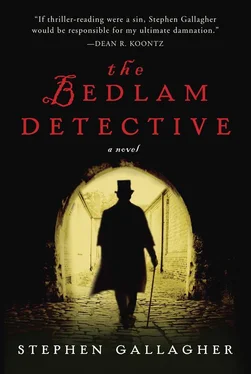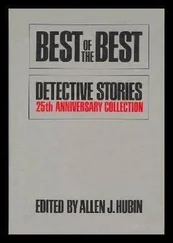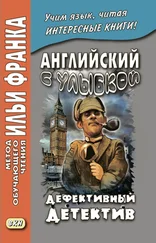Stephen Gallagher - The Bedlam Detective
Здесь есть возможность читать онлайн «Stephen Gallagher - The Bedlam Detective» весь текст электронной книги совершенно бесплатно (целиком полную версию без сокращений). В некоторых случаях можно слушать аудио, скачать через торрент в формате fb2 и присутствует краткое содержание. Жанр: Исторический детектив, на английском языке. Описание произведения, (предисловие) а так же отзывы посетителей доступны на портале библиотеки ЛибКат.
- Название:The Bedlam Detective
- Автор:
- Жанр:
- Год:неизвестен
- ISBN:нет данных
- Рейтинг книги:5 / 5. Голосов: 1
-
Избранное:Добавить в избранное
- Отзывы:
-
Ваша оценка:
- 100
- 1
- 2
- 3
- 4
- 5
The Bedlam Detective: краткое содержание, описание и аннотация
Предлагаем к чтению аннотацию, описание, краткое содержание или предисловие (зависит от того, что написал сам автор книги «The Bedlam Detective»). Если вы не нашли необходимую информацию о книге — напишите в комментариях, мы постараемся отыскать её.
The Bedlam Detective — читать онлайн бесплатно полную книгу (весь текст) целиком
Ниже представлен текст книги, разбитый по страницам. Система сохранения места последней прочитанной страницы, позволяет с удобством читать онлайн бесплатно книгу «The Bedlam Detective», без необходимости каждый раз заново искать на чём Вы остановились. Поставьте закладку, и сможете в любой момент перейти на страницу, на которой закончили чтение.
Интервал:
Закладка:
Stalked by monsters, torn by beasts. And an estate on which, it now seemed, people vanished and young girls of a certain age and development could not play in safety.
As Sebastian’s predecessor had first noted, there seemed to be something more than coincidental misfortune at work here.
When Sebastian stepped out into the main street, he could see that new activity had begun around the assembly rooms. Locals were again gathering outside. A hearse wagon and two undertakers’ men waited by the doors. Becoming aware of two women passing behind him, Sebastian tipped his hat to them; they didn’t even notice. He heard one telling the other that the parents had arrived and had gone in with the police. The women went on to join the assembly room crowd, and Sebastian turned away.
The grief of the parents would be a hard sight to bear. He understood that there was a low point in any journey such as theirs. Some called it the hour of despair; others, the suicide hour. The notion was that if one could pass through it, then hope would begin. The hour could be deferred, or it could be ignored for a while. But if life were to continue, it could not be avoided. How did one pass through a loss so profound? He couldn’t begin to imagine it.
The town’s one-roomed museum and library was on a steep little street that led down to the harbor. It was a humble whitewashed building with a surprisingly grand door. There was an imposing house above it, and less imposing houses below.
Sebastian tried the door. It was unlocked, so he went inside.
It was historical exhibition and reading room combined. Arnmouth’s modest history was covered by six glass cases of coins and other objects, some Roman stones, and a dozen or more framed oil paintings of local estates. The farther part of the room featured two long tables with eight chairs to each. Beyond them was a counter, behind which was a woman. She seemed surprised by his presence.
Raising her voice to reach him, she said, “I don’t open until nine thirty.”
Sebastian glanced back. “Your door isn’t locked,” he said.
“I don’t need to keep it locked,” she said. “Everybody knows I don’t open until nine thirty. What do you want?”
He’d reached the counter now. The woman had iron-gray hair, pinned up. She wore a high-collared blouse and she held herself straight. Despite his transgression, she didn’t seem ready to order him out, and so he decided to press his luck.
Sebastian said, “Do you keep a local newspaper?”
“In the racks,” she said, “over there.” And she pointed to a frame where three or four broadsheets hung from rods, cafe-style. “Leave it out on the table when you’re finished.”
Sebastian glanced briefly and said, “I meant old newspapers. Whichever volume might have the story of Grace Eccles and Evangeline Bancroft.”
The woman’s manner seemed to chill, and her face became set.
“What story would that be?” she said.
“About the time where they were lost on the moors,” he said. “I understand that it was a good few years ago.”
“I’m afraid all those issues are at the bindery.”
“Can you check that for me?”
Her face betrayed nothing.
“I don’t need to,” she said.
“Perhaps I’ll talk to Miss Eccles, then. Can you tell me where to find her?”
“I don’t advise it.”
“All the same, I’d like to.”
“Grace took over her father’s cottage on the Lancaster estate. You can try talking to her, but I doubt she’ll have much to say to you.”
“Can you tell me what happened?”
“No,” she said, “I can’t.” And she walked off into an inner room behind the counter, leaving him alone.
He got back to the Sun Inn at five minutes before ten. Sir Owain’s car was already waiting, its engine idling and Sir Owain’s chauffeur behind the wheel. When the driver saw Sebastian, he hopped out and had the passenger cab door open by the time he reached it. There was no one else in the car.
“Thank you,” Sebastian said, and climbed aboard. He settled back into the buttoned leather seat as the driver returned to his place.
Sebastian tried to look as if he were used to this. But of course, he wasn’t. The landaulet was a rich man’s transport, and Sebastian was not a rich man. It was, in essence, the coachwork of the finest horse carriage built onto a heavy motor chassis. The passenger rode in comfort while the driver faced the elements behind the engine, bundled up in leather and goggles with just a short windshield for protection.
But to drive one was a mark of prestige for any servant. And this man knew it. Small boys stopped to watch as the car swung around in the street and they headed out of town, along the road that Sebastian had come in by. Instead of crossing the river to the station, they turned inland.
Sebastian leaned forward and knocked on the glass that separated him from the driver. He had to knock again, and harder, before he was heard.
The driver unhooked a catch, and the window cracked open an inch or two. The wind roared through the gap. The driver cocked his head toward it, without taking his eyes off the road.
Sebastian raised his voice and half-shouted, “Where’s the cottage that Grace Eccles lives in? Is it on this road?”
The driver shook his head. Then said, “It’s over toward the river.”
“Can we reach it by car?”
“Not without making you late. Sir Owain’s waiting.”
“Sir Owain can wait a while longer. I want to visit her first.”
The road hit a patch of bad repair, and Sebastian did nothing to gain the driver’s favor by having distracted him so that he failed to avoid the worst of it.
When they were done bumping, the driver said, “I can’t do that, sir. I take my instructions from my employer.”
Watching the man’s gloved hands on the wheel, Sebastian said, “And do those instructions include rummaging through the hotel rooms of his visitors?”
He saw the driver’s grip tighten for just a moment, which gave him his answer before the man said, “I have no idea what you can mean by that, sir.”
“Never mind,” Sebastian said. “Today your employer answers to me. So you’ll take me first to Grace’s cottage, please.”
TWELVE
As they followed the course of the river inland, the estuary plain was wide and sandy. But the sand gradually turned to a mixture of sand and mud, that in turn grew a surface of moss and vegetable scum, that in turn became wide open fields where animals grazed. On a raised bank overlooking these flats, they passed a row of upturned boats and dinghies like the shells of sleeping turtles.
After another mile or so, a bare track led to an open place by the water. At the end of the track was a collection of mismatched wooden buildings, at the heart of which stood a ramshackle stone cottage. The roofs of the buildings had all been repaired with tarpaper. There was a straw-covered yard before the cottage and beyond the yard, a gate in a rail fence led out into open paddock and grazing land. This was poor land, low-lying and liable to flood.
As they were approaching, Sebastian thought that he saw a figure flit between two of the buildings. The track was growing rougher, and the driver stopped the car with at least a dozen or more yards still to go.
He clearly didn’t expect to be staying here for long. He kept the engine running as he got out to open Sebastian’s door.
As Sebastian stepped down, the driver said, “You should know this is a waste of your time.”
“How so?” Sebastian said, noting the presence of horses far off in the paddock, right down by the water.
“Grace Eccles can be a bit wild. I’m telling you, she’s known for it.”
Читать дальшеИнтервал:
Закладка:
Похожие книги на «The Bedlam Detective»
Представляем Вашему вниманию похожие книги на «The Bedlam Detective» списком для выбора. Мы отобрали схожую по названию и смыслу литературу в надежде предоставить читателям больше вариантов отыскать новые, интересные, ещё непрочитанные произведения.
Обсуждение, отзывы о книге «The Bedlam Detective» и просто собственные мнения читателей. Оставьте ваши комментарии, напишите, что Вы думаете о произведении, его смысле или главных героях. Укажите что конкретно понравилось, а что нет, и почему Вы так считаете.












